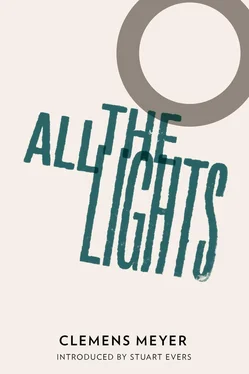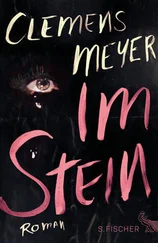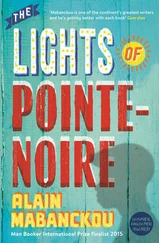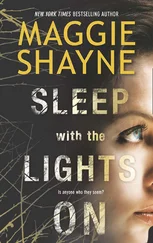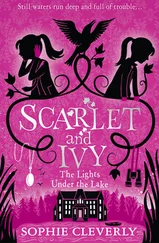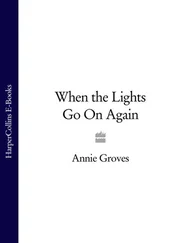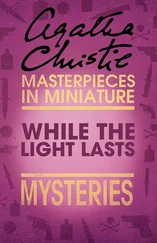She’s naked, and her skin’s so white I close my eyes for a moment. The cops say something but I take no notice, I just look at her lying there so still in front of me. Her hair’s fallen over her face so I can’t see her eyes. What I see is my hands round her neck. The marks of my hands.
They lead me out of the bedroom, my arms behind my back. It’s dark in the living room, broken glass crunches under my feet, and as they shove me into the hall I turn around one more time.
Outside the window, in the light of the street lamp, Mary Monroe smiles at me.
She was very shy. She always looked down at the floor when she came up to the blackboard. An eleven-year-old girl with brown hair down to her shoulders. Year five. Sometimes she wore her hair in a short ponytail. She was slightly pale. A long school year, year five. Later she turned twelve. That was after the summer holidays, at the start of year six. He still remembered her birthday very clearly. The way her friends had whispered and laughed as he stood at the garden gate and waved at her. He’d been sweating, and his face must have been bright red, like it always was when he sweated. She’d smiled and raised her hand briefly and then looked down at the ground. She was very shy. She raised her top lip slightly when she smiled and he saw her front teeth. The two in the middle were a tiny bit longer than the ones next to them, but just a tiny bit. And when she thought about things and got annoyed, all the numbers, that small crease ran from the top of her nose to her forehead.
He thought of all this often, imagining it, especially when he was alone and eating, and he ate a lot and was usually alone. Always, actually. He was eating a whole salami. Now he put it aside; the pain was back in his left arm, starting in his chest, aching, getting stronger, so strong that his breath came short and he felt dizzy. He laid the salami carefully on the plate, alongside a thick pork cutlet in aspic and three slices of bread and butter. He walked around the kitchen, massaging his left arm and then his chest, went to the door, saw the dark, long hallway ahead of him, the white doors, bedroom, living room, and went back to the table. He sat down, his belly brushing against the table, and the plate and the teapot and the glass gave a slight rattle. He’d hardly drunk any coffee since the stabbing and aching in his left arm and chest had started to come more and more often. He’d been meaning to go to the doctor for weeks, but he barely left the house now.
The last time he’d been out for a walk, a couple of days ago, he’d stopped at that garden gate. It was a small block of flats but it was a couple of years now since she’d lived there. She was nearly twenty-one now; it would be her birthday in twelve days. He’d leaned on the garden gate, and although it was quite cool — the entire summer had been cool and rainy — he’d broken out in a sweat. She had tied up her brown hair in two little bunches. A brightly coloured party dress. Balloons in the trees. Her parents had been sitting at a table, and he stood at the garden gate, stood there a good while and hoped they might invite him in for a cup of coffee and a piece of cake. But they hadn’t even said hello, even though they’d seen him. He waved at her again, and she smiled, then turned around and ran to her friends, who looked over at him and whispered and laughed. He turned away and left. The bag with the teddy in it knocked against his leg as he walked. The teddy was holding a calculator in both hands. The teddy had been quite expensive; the calculator was a new model. The calculator teddy was wearing a mortarboard and large spectacles. Its shirt was decorated with numbers; it didn’t have any trousers. It had small plastic rods on its hands where you could push the calculator in and out again. He’d given her the teddy later, after class. ‘Could you stay behind for a minute please,’ he’d said to her, ‘I want to have a word with you about the last test.’ She hadn’t done particularly well in the last test, even though she’d often stayed behind after class for extra tuition. There were four in the group: three boys and her. Sometimes they’d done more practice on their own after that, once the others had gone, twenty or thirty minutes, or longer. She was really good at German and most other subjects, among the best in the class, but maths … And he did everything he could for her, to help her understand numbers and learn to like them. He loved numbers.
‘Here, for you.’ He put the calculator teddy on the table in front of her. ‘Happy Birthday.’ She reached hesitantly for the teddy and pulled it slightly closer to her. ‘Belated best wishes,’ he said, ‘Happy Birthday, Juliana.’
‘For me?’ she said, smiling and raising her top lip slightly and looking down at the table. Then she lifted her head, looked at him and said, ‘Thank you, thanks.’
He sat down on the little chair next to her, his belly brushing against the table. ‘Imagine we’re in a florist’s,’ he said, ‘and you buy yourself seven lovely flowers, and they cost …’ he thought for a moment, ‘they cost seventeen marks fifty.’ ‘What kind of flowers, Mr Krein?’ she asked, still holding the teddy tight in one hand. He thought again. ‘Roses,’ he said. ‘No, lilies.’ The exercise was in the textbook and it said roses there, seven roses, but he wanted her to buy herself lilies, even though he knew nothing about flowers. ‘Why are lilies so expensive?’ she asked.
‘They’re,’ he said, ‘they’re especially beautiful lilies, special lilies,’ and she nodded. ‘So, one lily,’ he said, ‘how much does one lily cost?’
She took the calculator, removing it carefully from the teddy’s hands, and he said, ‘No, wait a moment. Write it down first and work it out, and then you can check it.’
She put the calculator aside, picked up her fountain pen and bent over her exercise book. ‘Seven lilies,’ she said softly. ‘Seventeen marks fifty,’ he said, leaning over to her. ‘And how much does one cost?’ He saw her writing the numbers in the little squares. He saw the small crease running from the top of her nose to her forehead.
Sweat ran down his face, and then the stabbing and aching was back again, from his chest to his left arm, and he held onto the garden gate for support. ‘Juliana,’ he said. Her friends called her ‘Juli’ — like the month. The school holidays were in July, the long summer holidays. He held onto the garden gate for support, with both hands. Then he closed his eyes and waited. He opened his eyes and saw the plate of food in front of him. ‘Happy Birthday, Juli,’ he said. But then he noticed that no time had passed, that he was still sitting at the table, with the same salami, the same cutlet in aspic shining in the light falling through the kitchen window. He ate salami and pork cutlet in aspic every evening; he hardly left the house now and he often thought of her birthday, the closer it came. Did she have a boyfriend, he wondered. Probably, she was almost twenty-one after all. But she’d always been so shy. Had always looked so shyly down at the floor when she came up to the blackboard. Perhaps she had a child already, a small child. He banged on the table, swept his open palm across the table. The plate fell on the floor and shattered, the salami bounced across the tiles, he had a nice tiled kitchen and the cutlet in aspic slapped onto the tiles with a dry splat and stayed put as if it were stuck to the floor.
He lowered his head carefully onto the tabletop. He was fifty-four and he was never going to have children. He stayed like that for a while, resting his arms on his belly and folding his hands together. ‘If I become a father at the age of fifty-five, and my daughter has a son at twenty-three, how old would I have to be for my five-year-old grandson …’ He fell silent. Even numbers brought him no pleasure any more. There was no one there any more to whom he could explain the magic of numbers. And there hadn’t been for a long time now. ‘Five to the power of four,’ he said. ‘That’s five times five times five times five. The small number controls the big one.’ He took her hand. ‘Count it on your fingers, go ahead. One times five, times five for the second time, times five for the third time, times five for the fourth time.’ She counted. ‘The small number controls the big one,’ she said, and he looked at the crease above her nose, ‘five to the power of two is twenty-five, that’s easy, five to the power of three is twenty-five times two.’
Читать дальше
